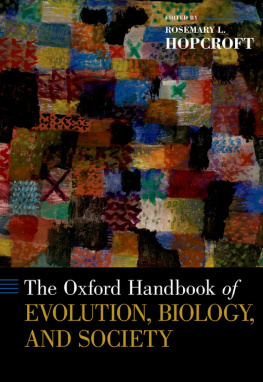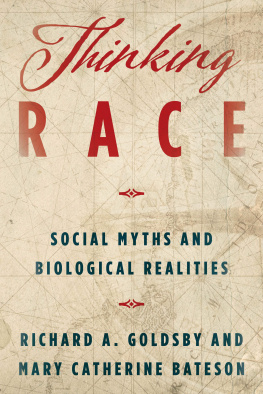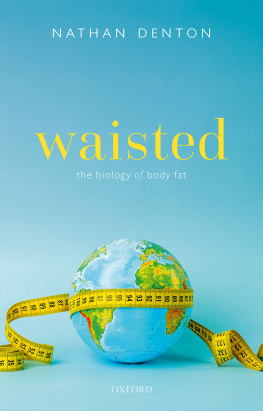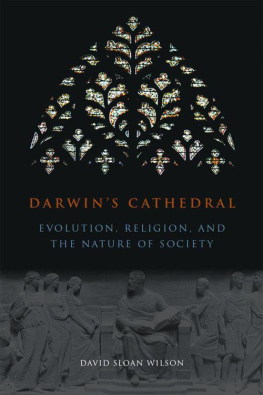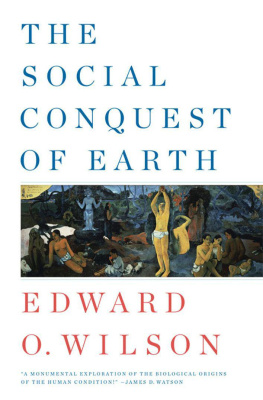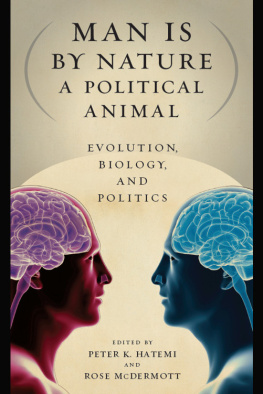THE OXFORD HANDBOOK OF
EVOLUTION, BIOLOGY, AND SOCIETY
THE OXFORD HANDBOOK OF
EVOLUTION, BIOLOGY, AND SOCIETY
Edited by
ROSEMARY L. HOPCROFT
Oxford University Press is a department of the University of Oxford. It furthers the Universitys objective of excellence in research, scholarship, and education by publishing worldwide. Oxford is a registered trade mark of Oxford University Press in the UK and certain other countries.
Published in the United States of America by Oxford University Press
198 Madison Avenue, New York, NY 10016, United States of America.
Oxford University Press 2018
All rights reserved. No part of this publication may be reproduced, stored in a retrieval system, or transmitted, in any form or by any means, without the prior permission in writing of Oxford University Press, or as expressly permitted by law, by license, or under terms agreed with the appropriate reproduction rights organization. Inquiries concerning reproduction outside the scope of the above should be sent to the Rights Department, Oxford University Press, at the address above.
You must not circulate this work in any other form and you must impose this same condition on any acquirer.
Library of Congress Cataloging-in-Publication Data
Names: Hopcroft, Rosemary L. (Rosemary Lynn), 1962- editor.
Title: The Oxford handbook of evolution, biology, and society / [edited by] Rosemary L. Hopcroft.
Other titles: Evolution, biology, and society
Description: New York : Oxford University Press, [2018] | Includes bibliographical references.
Identifiers: LCCN 2017030134 | ISBN 9780190299323 (hardcover) | ISBN 9780190299330 (epub)
Subjects: LCSH: SociobiologyHandbooks, manuals, etc.
Classification: LCC HM628 .O94 2018 | DDC 304.5dc23
LC record available at https://lccn.loc.gov/2017030134
C ONTENTS
R OSEMARY L. H OPCROFT
R ICHARD M ACHALEK
D OUGLAS A. M ARSHALL
S TEPHEN K. S ANDERSON
J ONATHAN H. T URNER
A LEXANDRA M ARYANSKI AND J ONATHAN H. T URNER
M ICHAEL H AMMOND
D AVID D. F RANKS
S ATOSHI K ANAZAWA AND N ORMAN P. L I
J OSEPH M. W HITMEYER
C OLTER M ITCHELL
R OSE M C D ERMOTT AND P ETER K. H ATEMI
K EVIN M. B EAVER , E RIC J. C ONNOLLY , J OSEPH L. N EDELEC, AND J OSEPH A. S CHWARTZ
A DAM L OCKYER AND P ETER K. H ATEMI
F RANOIS N IELSEN
O LGA K ORNIENKO AND D OUGLAS A. G RANGER
J EFF D AVIS AND K RISTEN D AMRON
D ANIEL E. A DKINS , K ELLI M. R ASMUSSEN, AND A NNA R. D OCHERTY
A LLAN M AZUR
T IMOTHY C RIPPEN
A NNA R OTKIRCH
MARTIN FIEDER AND SUSANNE HUBER
L EE E LLIS
A NTHONY W ALSH AND C ODY J ORGENSEN
F RANK S ALTER
K RISTIN L IV R AUCH AND R OSEMARY L. H OPCROFT
S TEPHEN K. S ANDERSON
M ARION B LUTE AND F IONA M. J ORDAN
R OSEMARY L. H OPCROFT
Rosemary L. Hopcroft is Professor of Sociology at the University of North Carolina at Charlotte. She has published widely in the areas of evolutionary sociology and comparative and historical sociology in journals that include the American Sociological Review, American Journal of Sociology, Social Forces, Evolution and Human Behavior , and Human Nature . She is the author of Evolution and Gender: Why It Matters for Contemporary Life ().
Daniel E. Adkins is Assistant Professor of Sociology, Human Genetics, and Psychiatry at the University of Utah. His research, broadly quantitative and interdisciplinary, integrates social inequality perspectives on stress with genomic big data to map how social disadvantage becomes epigenetically encoded, influencing downstream gene expression, health, and behavior. He has published over 50 peer-reviewed articles in high-impact sociology, psychiatry, and genetics journals. In addition to pursuing his own eclectic research interests and teaching statistics, he serves as statistical consultant to the Utah Consortium for Families and Health Research.
Kevin M. Beaver is Judith Rich Harris Professor of Criminology and Criminal Justice at Florida State University and visiting Distinguished Research Professor in the Center for Social and Humanities Research at King Abdulaziz University. His research examines the causes of antisocial behavior.
Marion Blute is Professor Emeritus of Sociology at the University of Toronto. Her theoretical interests are in selection processes of all sorts, and her empirical interests are in the sociology of science/scholarship and genders. She is a member of the editorial advisory board of Biological Theory , of the editorial board of Spontaneous Generations: A Journal for the History and Philosophy of Science , and an associate of Behavioral and Brain Sciences. She is past Chair of the Evolution, Biology and Society section of the American Sociological Association and a past member of the nominations and of the Marjorie Grene and Werner Callebaut Prize Committees of the International Society for the History, Philosophy and Social Studies of Biology. Her monograph, Darwinian Sociocultural Evolution: Solutions to Dilemmas in Cultural and Social Theory , was published by Cambridge University Press in 2010.
Eric J. Connolly is Assistant Professor in the Department of Criminal Justice and Criminology at Sam Houston State University. His research interests include biosocial criminology, criminological theory, developmental/life course criminology, and victimology. His work focuses on examining the genetic and environmental contributions to individual differences in antisocial behavior at different stages of the life course.
Timothy Crippen is Professor of Sociology at the University of Mary Washington. He has specialized expertise in the evolution of various aspects of human social behavior and in sociological theory. He is co-author (with Joseph Lopreato) of Crisis in Sociology: The Need for Darwin (Routledge, 2001). His work has been published in Social Forces, Human Nature , and Sociological Perspectives , among other academic journals, and he has contributed chapters to various edited scholarly volumes.
Kristen Damron is a graduate student in sociology at California State University, Long Beach. Her work focuses on the impact of stressful social conditions on health. She plans to pursue research on positive psychology in the near future.
Jeff Davis is Professor at California State University in the Departments of Sociology and Human Development. He has published in the areas of neurosociology, human behavioral ecology, and social inequality. His research focuses on the harmful effects of structural inequalities on neurobiological functioning and social behaviors.
Anna R. Docherty is Assistant Professor of Psychiatry at the University of Utah and the Virginia Commonwealth University. Her research integrates dimensional phenotypic assessment and genomic data to predict risk for severe psychopathology. She explores strategies for genetic subtyping and risk analysis, and also the influences of comorbid conditions on psychiatric trajectories.
Lee Ellis is a semi-retired former Professor of Sociology at Minot State University and Visiting Professor in Anthropology and Sociology at the University of Malaya. His main areas of research are sex differences in behavior, social stratification, criminality, and religion.

